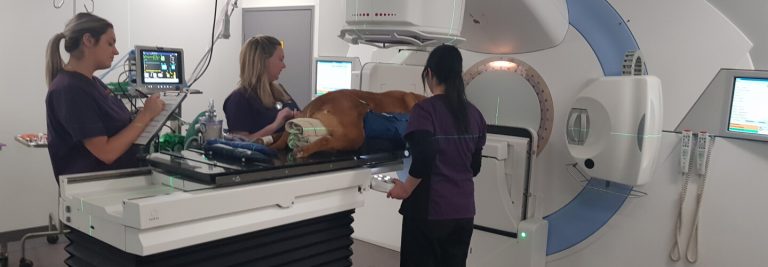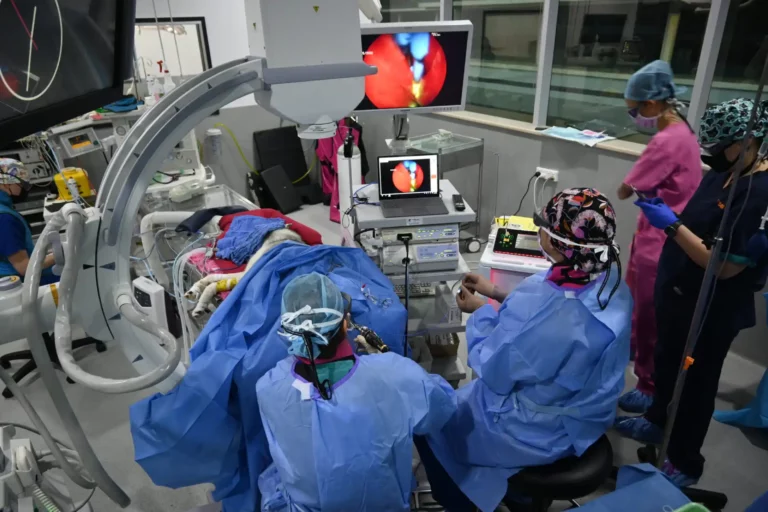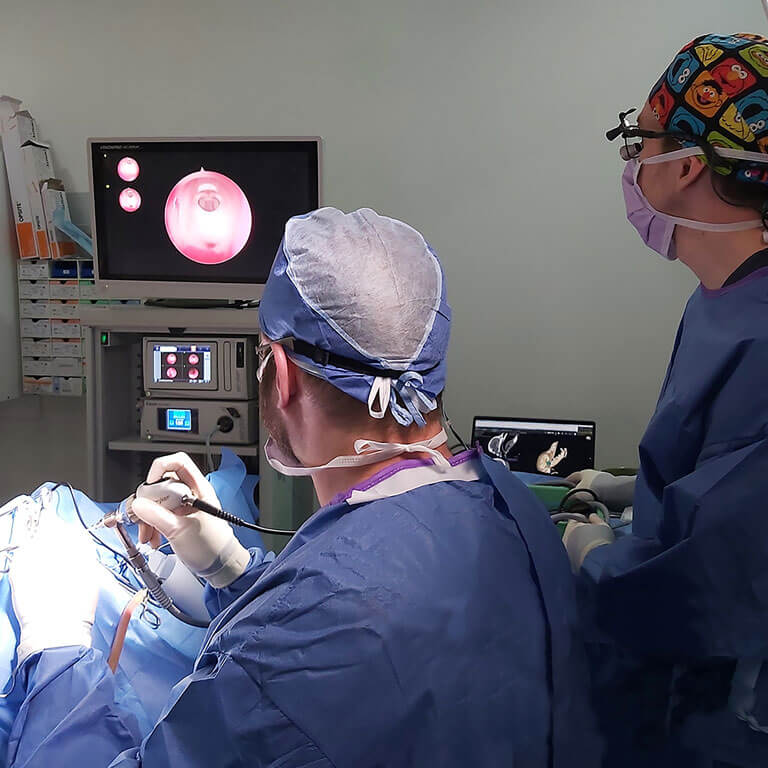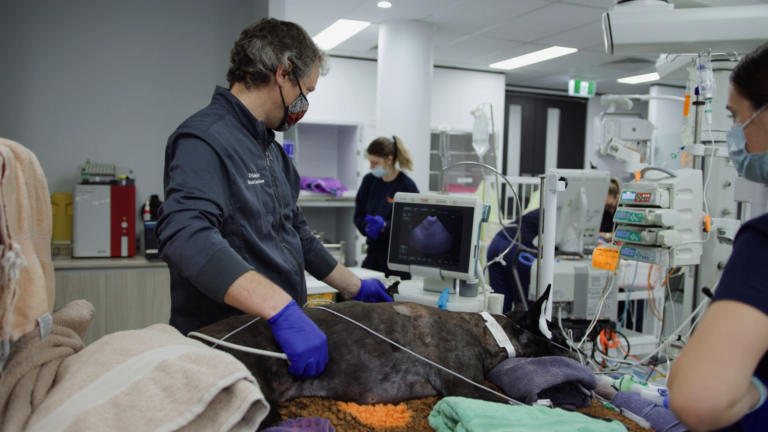SASH Cancer Centre information for referring veterinarians
The SASH Cancer Centre is the only permanently on-site, multidisciplinary cancer centre in Australia. Completed in 2018 with the commission of the country’s first veterinary linear accelerator for radiation therapy with stereotactic capabilities, the SASH Cancer Centre offers the most comprehensive and proven techniques by combining on-site specialist medical, radiation, and surgical oncology, together with supporting on-site specialist departments to achieve the best possible patient outcomes.
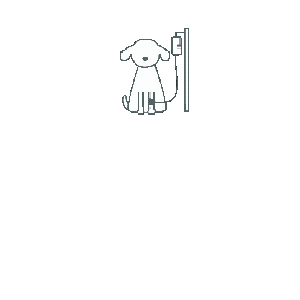
Why refer to SASH Cancer Centre
The SASH Cancer Centre works closely with referring veterinarians and values communication. The SASH Oncologists welcome referring vets contacting them to discuss diagnostic approaches and treatment options so they can work together, from the outset. By having the whole spectrum of Oncologists in a single location, together with all other complementary specialist services, the SASH Cancer Centre can provide continuity of care, and a single, centralised point of communication for the referring vet and pet owner ensuring the best possible outcome.
The SASH Cancer Centre has many unique attributes, focused entirely on the patient and client:
- Australia’s largest team of specialist oncologists
- 6 Board-certified Medical Oncologists + Registrars & Residents
- Australia’s only dedicated on-site Board-certified Radiation Oncologist
- NSW’s only Fellow in Surgical Oncology + 9 Board certified Surgical Specialists
- NSW’s only dedicated on-site veterinary LINAC for radiation therapy
- Advanced medical treatments (e.g. electro-chemotherapy)
- Proven track record and client satisfaction. In 2022, 121 SASH Cancer Centre clients responded to a satisfaction survey with 90% stating they would highly recommend the SASH Cancer Centre.
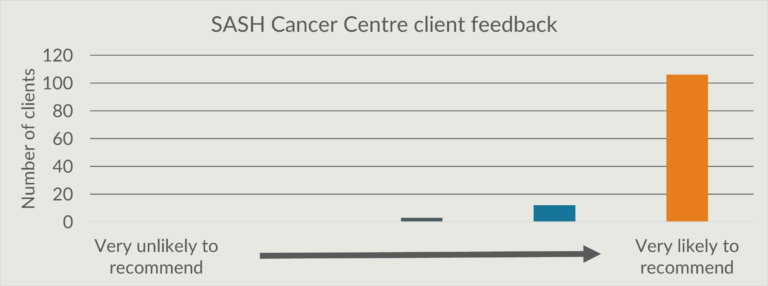
The SASH Cancer Centre is supported on-site by Australia’s largest and most comprehensive team of specialists from complementary departments:
- Anaesthesia – the largest Specialist Anaesthesia team in Australia. Essential for many oncology patients due to the high anaesthesia risk often associated with these patients
- Diagnostic Imaging – Australia’s largest on-site Specialist Diagnostic Imaging team with 128 slice CT, 1.5 Tesla MRI, and radiologist ultrasound. On-the-spot reporting is available and allows for rapid assessment and commencement of treatment
- Pathology – the only private vet hospital with specialist in-house pathology for rapid reporting. Cases can be internally triaged based on urgency
- Critical Care – Australia’s largest team of Specialist Criticalists to improve outcomes for patients requiring ICU care
Interstate referrals are welcomed at the SASH Cancer Centre. SASH commonly sees referrals that have travelled significant distances, especially for RT. This is made possible with an on-site LINAC with 24/7 care and medical boarding facilities built adjacent to the radiotherapy facility.
Radiation oncology
Radiation therapy (RT) involves the use of a linear accelerator (LINAC) to deliver powerful, high-energy x-rays to treat cancer and other medical conditions. The state-of-the-art Elekta system at SASH North Ryde is capable of delivering radiation in a highly precise, targeted, and conformal manner, thereby irradiating the tumour with minimal irradiation of surrounding healthy tissue. Radiation works by damaging the DNA in cells, which can then result in tumour cells becoming incapable of any further cell division, or tumour cells being killed as a result of sustaining too much DNA damage.
Radiation therapy may use RT alone or in combination with other oncological treatments. Examples include:
Shrinking a tumour prior to surgical intervention to improve likelihood of complete excision with wide margins
Eradicate microscopic disease after excision of a tumour
Combined with chemotherapy to increase cell susceptibility to radiation, or to treat aggressive cancers with both local and systemic modalities
Sequential half body irradiation, in conjunction with multi-agent chemotherapy, for dogs with multicentric lymphoma
The SASH Cancer Centre is the only veterinary hospital in Australia that offers all types of radiotherapy treatment protocols on-site with a fully dedicated and on-site Radiation Oncology Specialist. These include Definitive RT, Stereotactic RT, Palliative RT, and Sequential Low Dose Rate Half Body Irradiation for canine lymphoma.
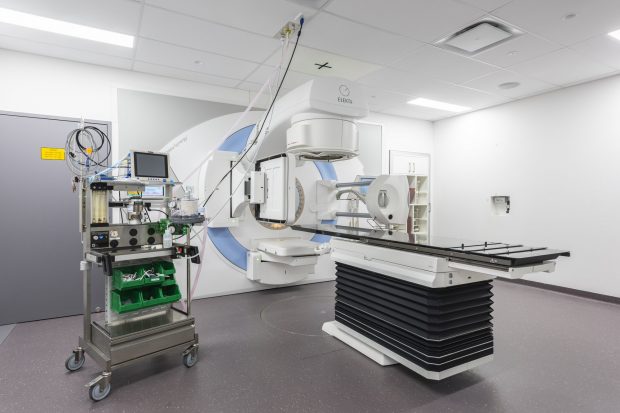
Definitive radiation therapy
The goal of definitive RT is to provide long-term control of cancer by delivering the largest total dose possible in the safest manner. It is administered in multiple doses over a period of weeks, e.g., daily Monday to Friday over two to four weeks. By fractionating the total dose into multiple small dose treatments, we are able to reduce the risk of long-term side effects to a minimum. Due to the nature of the protocol, definitive RT is usually only possible with an on-site LINAC since each treatment involves a brief general anaesthetic.
Examples of cancers commonly treated with definitive RT include brain tumours, nasal tumours, and incompletely resected tumours where there is residual microscopic disease left behind after surgery.
Stereotactic radiation therapy
Stereotactic radiation therapy (SRT) is typically used for small or well-defined tumours with tight dose margins. High doses of radiation are delivered either daily or every other day for three to five treatments, usually over a single week. Although SRT also has the objective of providing long-term control, its applications are generally limited to cancers such as well-defined brain tumours, nasal tumours, and some others. The risk of potentially harmful, long-term side effects is higher with SRT than with definitive RT, so it is imperative that appropriate patients are selected for SRT protocols – not all patients, and not all tumours, are appropriately treated with SRT.
Palliative radiation therapy
Palliative RT is used to alleviate pain and improve quality of life, and is not intended for long-term control. Typically, relatively higher doses of radiation are delivered in fewer days. Examples of treatment protocols vary and can include either daily (Monday to Friday) over one week, or once weekly over three to six weeks.
Examples of cancers commonly treated with palliative RT include oral melanoma in dogs, thyroid tumours in dogs that are not good surgical candidates, and osteosarcoma (bone tumours) in dogs for pain relief.
Sequential Low Dose-Rate Half Body Irradiation (HBI)
Lymphoma is generally very highly sensitive to radiation (it is actually the most radiation-sensitive type of tumour cell we know of), with a large proportion of cancerous lymphocytes killed with generally low doses. Since lymphoma is a “whole-body” disease, we cannot safely irradiate the entire body all at once. However, a recent study revealed that incorporating Sequential HBI (where the upper and lower body halves are each treated to a single, fairly low dose of radiation 2 weeks apart) in conjunction with standard multi-agent chemotherapy, can give dogs with B-cell lymphoma a 50-55% chance of having a 2-year or longer remission of their disease, as opposed to just roughly a 15% chance of this with only multi-agent chemotherapy.
Medical oncology
At the SASH Cancer Centre, chemotherapy is a mainstay of medical oncology provided by our dedicated team of Medical Oncology Specialists. Generally, the mode of action of chemotherapy drugs is through interrupting cell division.
Like other modalities of cancer treatment, chemotherapy can be used alone or in conjunction with radiation and/or surgical interventions. The most appropriate protocol will depend on the patient, the type of cancer, and the owner’s wishes.
Protocols and the exact drug(s) used vary greatly. They can include any combination of at-home oral medications, injectables, and infusions which can be administered to outpatients. Although some chemotherapy treatments can be life-long, most are several weeks to months in duration. If a relapse occurs following remission, chemotherapy can be resumed.
As complete cure may often not be possible, the primary objective of chemotherapy is to improve quality of life and slow the progression of cancer. Depending on the patient and type of cancer, survival can be extended from months to years. Oncologists can provide detailed information about average life expectancy with and without treatment. This information can be used by pet owners along with practical and financial considerations to make an informed decision about their pet.
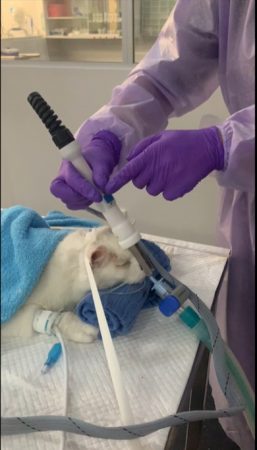
Surgical oncology
Surgical oncology is an integral part of oncologic therapy, commonly used in cancer diagnosis and treatment. It is widely accepted that a well-performed first instance surgery provides the highest likelihood of cure. For this reason, collaboration between an Oncologist and an oncology trained surgeon is critical for best patient outcomes.
Diagnostic Surgery
Through diagnostic surgery or biopsy, part or all of the tumour can be removed for diagnostic testing by a pathologist. Doing so will provide guidance around prognosis and the development of a treatment protocol. Examples of diagnostic tools include FNAs, needle core biopsy (Tru-cut), punch biopsy, incisional biopsy, and excisional biopsy. It is vital to understand when and what diagnostic techniques to use as some times, biopsy can complicate later definitive intent therapy (e.g. incisional biopsy of anal sac tumours, thyroid tumours and carotid body tumours are usually contraindicated).
Therapeutic surgery
Well-planned and executed surgical removal of a tumour can be an effective single stage curative treatment for some types of cancer. Appropriate surgical dose should be selected based on expected tumour biology. For curative surgery, the entire tumour must be removed with a sufficient margin through either radical, wide, or marginal resection.
Marginal surgery involves removing the tumour with narrow margins laterally and by depth. Although often more desirable than radical or wide resection, marginal surgery is usually not appropriate for most aggressive tumours. However, when executed correctly, it can be as curative as radical or wide resections, if applied in the appropriate clinical context. Regardless of surgical dose selected, radiation or chemotherapy can be used as adjunct therapies where microscopic disease may remain from incomplete resection.
Where curative intent surgery is not possible, palliative surgery may be considered. Although survival time may not improve, this type of surgery will improve quality of life. Examples include splenectomy with a ruptured haemangiosarcoma or partial removal (cytoreduction) of an obstructive mass.
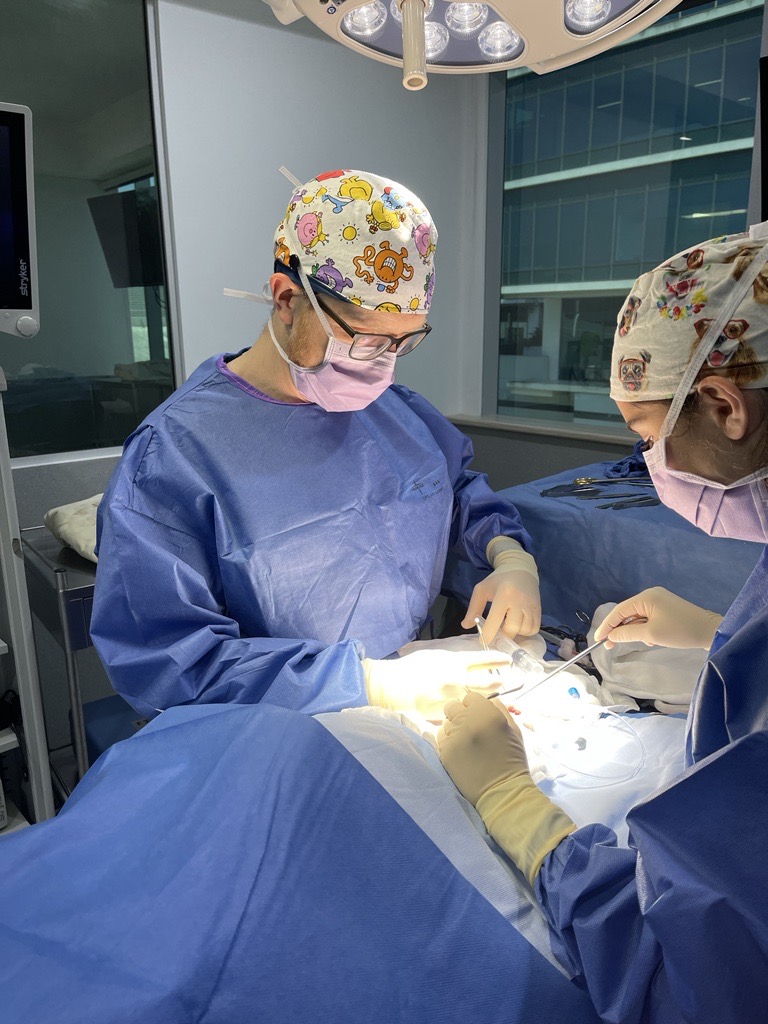
To find out more about the SASH Cancer Centre, please contact us at the link below. If you would like to learn more about oncology, a two-volume book, Vet’s Guide to Oncology is complementary to referring veterinarians.
